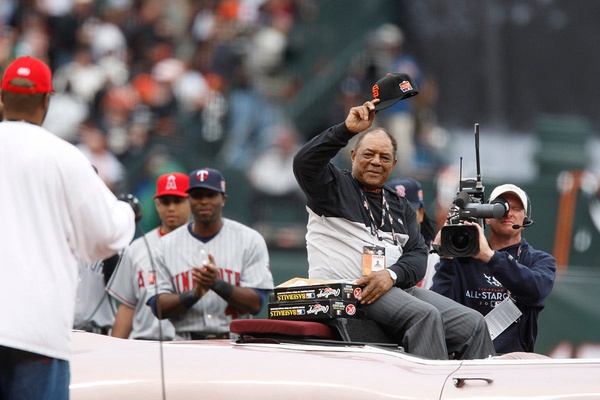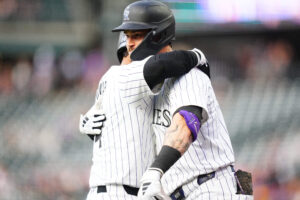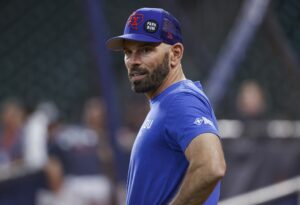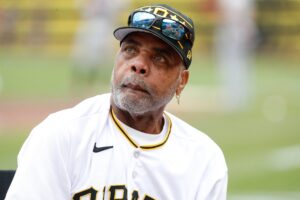Willie Mays, arguably the greatest all-around player to ever play baseball, has passed away at the age of 93. The news comes just two days before the San Francisco Giants and St. Louis Cardinals are scheduled to play a game at Rickwood Field in Birmingham, Alabama, where Mays played as a member of the Birmingham Barons of the Negro American League. The Giants announced the news Tuesday evening on social media. No cause of death was given.
It is with great sadness that we announce that San Francisco Giants Legend and Hall of Famer Willie Mays passed away peacefully this afternoon at the age of 93. pic.twitter.com/Qk4NySCFZQ
— SFGiants (@SFGiants) June 19, 2024
Willie Mays Has Passed Away at 93
Mays played for 22 years in the major leagues, beginning in 1951 with the New York Giants, following the Giants to San Francisco in 1958, and finishing with the New York Mets in 1972-73. For his career (Negro and major leagues combined), he hit .301/.384/.557 with 660 home runs, 1,909 RBI, and an OPS+ of 155. He won his only batting title in 1954. He also won four home run titles. It’s likely his home included more than one trophy case. There was a Rookie of the Year Award, two Most Valuable Player Awards, 12 Gold Gloves, and 20 All-Star teams (24 appearances). Mays played in four World Series, winning one.
Beyond the numbers, nobody who ever saw him play will ever forget it. There was the way he chased fly balls in center field, a mixture of grace and determination, his cap flying off as he made one of his patented basket catches. There was the way he would run from first to third, sliding safely like an avalanche, his grin visible through the dust. Although reporters covering his teams found him surly, he emitted joy on the playing field. The Treniers and the Baseball Project wrote songs about him. Former major leaguer Willie Mays Aikens was named after him. He was Barry Bonds’ godfather.
The supposedly grouchy Mays had a soft spot for children as well, as evidenced by several unpublicized acts. In 1963, when the Giants visited Pittsburgh to play the Pirates, he agreed to speak to children at the Western Pennsylvania School for the Blind. Mays had never responded to their letter requesting him to speak. He simply showed up when he was in town. Can you imagine Alex Rodriguez coming to your town as a visiting player and taking time to speak to schoolchildren? Me neither.
A Rough Start
Mays wasn’t an instant success. He joined the Giants at the age of 20, scared and unconfident. He began his career 1-for-26 after seven games. The hit was a home run off the Boston Braves’ Warren Spahn, like Mays a future Hall of Famer. Giants manager Leo Durocher found him crying at his locker stall. Mays didn’t think he could make it in the majors. Durocher convinced Mays he was a future star. With a vote of confidence, Mays never passed on his baseball career, and turned his season around, finishing up at .274/.354/.472 with 20 homers and 68 RBI. Mays was not yet a key member of the Giants, frequently batting seventh in the order. That’s where he was on October 3, 1951, waiting on deck as Bobby Thomson hit “The Shot Heard ‘Round the World.”
Mays’ Finest Hour
Mays’ finest hour may have occurred in Game 1 of the 1954 World Series. That was the Series when the Giants swept the heavily favored Cleveland Indians, who had won 111 games and featured two 20-game winners. It was the top of the eighth at the Polo Grounds in New York. Cleveland had two runners on base and no outs when Vic Wertz smashed a fly ball to deep center field. The Polo Grounds offered cheap home runs down the lines while measuring 483 feet to center field. Mays knew he had plenty of room to run. Running a long way after what looked surely to be an extra-base hit, Mays made a spectacular over-the-shoulder basket catch, then instinctively turned and fired the ball back to the infield to hold the runners. Some baseball observers say it was the greatest catch in World Series history. (Others beg to differ.)
One Last Hurrah
On May 11, 1972, Mets pitcher Charlie Williams became the answer to a trivia question. He was traded for Willie Mays. Something was in the air. Mays was supposed to make it back to the World Series, one more time, in the city where it all started for him. It finally happened in 1973. First, the Mets had to get past the favored Cincinnati Reds, the future Big Red Machine.
In the pivotal Game 5, the Mets led, 3-2, in the bottom of the fifth inning. With the bases loaded and nobody out, manager Yogi Berra selected Mays to pinch-hit for Ed Kranepool. At that point, Mays was but a shadow of his once-great self. He hit just .211/.303/.344, 6 HR, and 25 RBI. He’d already decided the 1973 season would be his last, so announced during his “Willie, Say Good-bye to America” speech. However, this time, he managed to hit a high infield chopper toward pitcher Clay Carroll. By the time it came down, all runners were safe and Mays had driven in a crucial run en route to a 7-2 victory. But alas, the Mets would lose the World Series in seven games to the Oakland Athletics.
The Last Word
Now that Willie Mays has passed away, nobody can do his life and career justice without writing a voluminous tome on the subject. We’ll close with the words of MLB commissioner Rob Manfred: “Thursday’s game at historic Rickwood Field was designed to be a celebration of Willie Mays and his peers. With sadness in our hearts, it will now also serve as a national remembrance of an American who will forever remain on the short list of the most impactful individuals our great game has ever known.”
Photo Credit: © Robert Hanashiro / USA TODAY NETWORK






